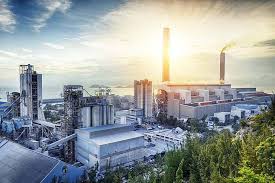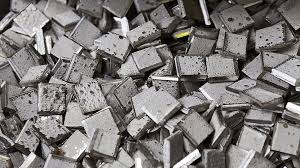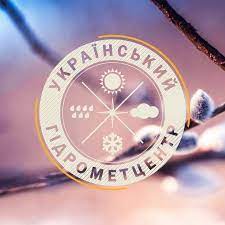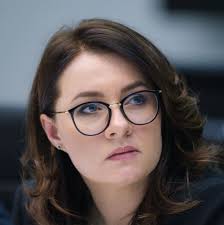
Ukrainian enterprises in January-April 2024 increased imports of zinc and zinc products – by 59.9%, up to $17.217 mln (in April – $5.357 mln). Exports of zinc for four months of this year amounted to $73 thousand (in April – $29 thousand), while in January-April 2023 it amounted to $48 thousand.
Zinc exports abroad in 2023 amounted to $130 thou. against $1.331 mln in 2022. Zinc exports for 2022 totaled $1.331 million, compared to $550 thousand in 2021. Exports of tin and tin products totaled $424 thousand in 2022, compared to $346 thousand in the previous year.
Zinc is used to protect steel from corrosion, in the production of zinc whitewash, in the metallurgical industry in the production of zinc sheets, and in the manufacture of foundry lead and copper-zinc alloys. It is also used as a material for the negative electrode in chemical current sources.

According to customs statistics released by the State Customs Service of Ukraine on Friday, Ukraine reduced imports of lead and lead products by 13.8% – to $406 thousand (in April – $124 thousand), imports of tin and tin products increased by 10.2% – to $887 thousand (in April – $267 thousand). Exports of lead and lead products decreased by 35.3% to $3.537 mln.
As reported, Ukraine in 2023 reduced imports of lead and lead products by 65.2% – to $989 thousand, imports of tin and tin products – by 23% – to $2.728 million. Exports of tin and tin products amounted to $159 thousand against $424 thousand for 2022.
Zinc exports for 2022 totaled $1.331 million, compared to $550 thousand in 2021. Exports of tin and products totaled $424 thousand in 2022, compared to $346 thousand the previous year.
Lead is used to make bullets and shot. It is part of many alloys, such as bearing alloys, printing alloy, tin-lead solder, bronzes and brasses. .
Tin is often used as a protective coating due to these properties. It is the main constituent of solder and babbitts, typographic alloys and bronzes.

According to customs statistics released by the State Customs Service of Ukraine, Ukraine in January-April 2024 increased imports of aluminum and aluminum products – by 26.6% to $136.761 million (in April – $38.235 million). Exports of aluminum and aluminum products for the first four months of 2024 increased by 5% compared to the comparable period a year earlier – to $33.008 million (in April – $9.608 million).
In addition, Ukraine’s imports of aluminum and aluminum products increased by 7.7% to $366.463 million in 2023.
Exports of aluminum and aluminum products last year increased by 0.7% compared to 2022 – to $97.616 million. In addition, Ukraine in 2022 reduced imports of aluminum and aluminum products – by 33.4%, to $340.398 million.
Exports of aluminum and aluminum products in 2022 decreased by 42.7% compared to 2021 – to $96.972 million.
Aluminum is widely used as a structural material. The main advantages of aluminum in this capacity are its lightness, pliability for stamping, corrosion resistance, high thermal conductivity, and the non-poisonous nature of its compounds. In particular, these properties have made aluminum extremely popular in the production of kitchen utensils, aluminum foil in the food industry, and for packaging. The first three properties have also made aluminum a major raw material in the aviation and aerospace industries (recently displaced by composites, primarily carbon fiber). After construction and production of packaging – aluminum cans and foil – the largest industry-consumer of the metal is the energy sector.

Ukrainian enterprises in January-April 2024, according to customs statistics, increased imports of nickel and products by 60.1% compared to the same period of 2023 – up to $8.484 million (in April – $787 thousand million).
Ukraine in 2023 reduced imports of nickel and nickel products by 74.2% y-o-y in 2022 – to $15.391 mln. Ukraine in 2022 reduced imports of nickel and nickel products by 49.9% y-o-y in 2021 – to $59.754 mln.
The main area of nickel application is metallurgy. It is used in the production of high-alloy stainless steels. By adding nickel to the iron melt, metallurgists obtain strong and ductile alloys that are highly resistant to corrosion and high temperatures.

On Sunday, May 19, in Ukraine in the western, northern, in the afternoon and in the central regions in some places small short-term rains, thunderstorms; in the rest of the territory without precipitation, reports Ukrhydrometcenter. The wind is predominantly southeastern, 7-12 m/s.
The temperature at night is 9-14°, during the day 21-26°.
In Kiev on May 19, there will be light short-term rain and thunderstorms in some places. The wind is predominantly southeast, 7-12 m/s.
The temperature at night is 11-13°, during the day 23-25°.

First Deputy Prime Minister – Minister of Economy Yulia Sviridenko, following a visit to Argentina and Chile this week, noted the presence of joint interest in investments and reported on the prospect of concluding bilateral free trade agreements.
“We know that there is already interest of companies from pharmaceutical, agro-sectors, processing industry, which want to deepen cooperation with Ukraine. The free trade agreement with Argentina, which we are currently working on, can also contribute to this. Cooperation with Argentina is reaching a qualitatively new level,” Sviridenko was quoted as saying in the press release of the Ministry of Economy on Thursday.
As First Deputy Prime Minister pointed out in social network X following a meeting with Argentine Economy Minister Luis Caputo, the countries have a lot in common: from economic structures to approaches to the organization of management. According to her, the parties agreed to hold a meeting of the Joint Ukrainian-Argentine intergovernmental commission on trade and economic cooperation in October this year. The last time it was held 18 years ago. In addition, the possibility of holding a Ukrainian-Argentine business forum is being considered, the Ministry said in a release.
“This country is the leader of the strategically important for us region of Latin America, so strengthening the presence of Ukraine on the agenda – a contribution both to the development of business ties and security projects” – summarized Sviridenko.
She recalled that Argentina has allocated 16 packages of humanitarian aid to Ukraine for $600 thousand, and at the moment up to half a million Ukrainians live in the country.
In addition, representatives of the Ministry of Economy met with the Argentine Chamber of Commerce and Services (CAC) and the Argentine-Ukrainian Chamber of Commerce and Industry (CAUCI) and invited business and government representatives to participate in the Ukraine Recovery Conference (URC-2024), which will be held June 11-12 in Berlin.
“(…) On the agenda – the First Global Peace Summit initiated by President Vladimir Zelensky, strengthening business ties, deepening cooperation in the defense sector, support for the Ukrainian energy system against the background of Russia’s systemic shelling of our energy capacities,” – accentuated First Deputy Prime Minister.
It is indicated that the Ukrainian side also invited the leaders of Argentina to join the Global Peace Summit and become a co-leader of the working group on one of the items of the Peace Formula.
After Argentina, the Ukrainian delegation, which also includes the Minister for Strategic Industries Oleksandr Kamyshyn, Deputy Minister of Economy Oleksiy Sobolev, Ukrainian Trade Representative Taras Kachka, Deputy Minister of Defense Dmytro Klymenkov, and representative of the Commissioner for Equal Rights and Freedoms of Rights of National Minorities of Political and Religious Views Mikhail Spasov, went to Chile.
“The first visit of a high-ranking Ukrainian delegation to Chile in 19 years,” Sviridenko emphasized on social network X. She also invited Chilean business and government representatives to the URC-2024 in Berlin, promising them very concrete projects from partners.
“We have a lot in common with Chile, especially in mining and critical materials. We hope to deepen cooperation in this area. We also discussed the issue of logistics. The next step of our cooperation is to deepen the dialog at the level of chambers of commerce and industry of our countries,” First Deputy Prime Minister said.
At a meeting with Chilean Economy Minister Niko Grau, Sviridenko said that both sides are interested in sharing experience in attracting investments, pointing out that there is already an example of a Ukrainian company that has invested in Chile.
“The areas where we see the greatest potential for growth are mining, especially in terms of critical materials, agribusiness and digitalization. Also, Chile has a rich experience in developing public-private partnerships and is ready to share it,” the First Deputy Prime Minister pointed out.
At a meeting with Chilean Foreign Minister Alberto Claveren, Sviridenko invited Chilean leaders to join the first Global Peace Summit, in particular, to lead the fourth point of the peace formula concerning the return of Ukrainian children illegally deported by Russia. She thanked Chilean President Gabriel Borich, who expressed his willingness to join the Summit.